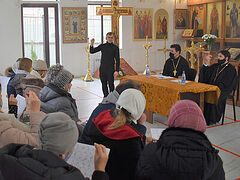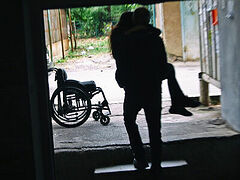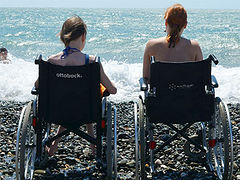 Katya Tishchenko Can you imagine a person who works all day long, solving unforeseen, nervous problems and conflicts, while becoming all the more happy and even healthy? Someone who, despite all the difficulties, is so in love with her job that she doesn’t even want to get paid.
Katya Tishchenko Can you imagine a person who works all day long, solving unforeseen, nervous problems and conflicts, while becoming all the more happy and even healthy? Someone who, despite all the difficulties, is so in love with her job that she doesn’t even want to get paid.
Please meet Katya Tishchenko, a volunteer of Russia’s “Miloserdie” (“Mercy”) service. For about nine years she has worked in the department of transport organization for those with special needs. Surprisingly, Katya is hardly able to move due to severe cerebral palsy. To cover short distances she needs crab sticks and for long journeys she uses a wheelchair. However, none of these mobility problems have prevented her from being other people’s “feet” for many years.
—Katya, please tell our readers how you became a volunteer.
—I have always dreamed of proving to everyone that disabled people can also be helpful.
Everyone is used to the fact that people with disabilities are infirm and need sympathy, but in reality they can always find an opportunity to help others. I really wanted all people with health issues to know about this and to learn to have a positive outlook on life.
—Why did you end up in the “Miloserdie” Orthodox help service?
—I am a psychologist by profession. I studied for six years on a par with everyone, and they didn’t make any allowances for my disability. I chose this profession because of my desire to be useful to people. As soon as I received my diploma, I began to call various foundations and say directly, “Hello! I am a certified psychologist. I have no experience and I have cerebral palsy, but I really want to work. Please, give me any job.”
—And how would they answer?
—In various ways... (Sighs sadly). Some immediately refused, others promised to think about it and call back later, but weeks went by, and no answers came. But the “Miloserdie” service staff said at once: “We will definitely come up with something for you!” And three days later they called me back and said: “We need a transport organizer. You won’t need to leave your home for this. Do you agree?” And, of course, I gladly agreed.
—What were your duties? Was it difficult to get going in this job?
—I became an assistant to the department coordinator—a very kind young lady named Xenia. She began teaching me everything. At first it was very hard, but Xenia explained everything to me so patiently and in such detail that everything finally worked out.
My duty was to find a volunteer with a car who would take a needy or seriously ill person where they needed to go—for example, to a hospital or a church service. Situations varied, but as you can imagine, people who called were in huge need, in trouble, and I understood that very well. They were nervous and worried, and this is where my experience as a psychologist came in handy.
—Can you tell us some specific cases of how you managed to console people?
—I just accepted their situation as if it were mine. For example, there was a call from the mother of a child with CP. She was very upset and crying. I would ask her which rehabilitation center they were going to, and then advise something from my personal experience. They saw my involvement and concern, shared their misfortune with me and gradually calmed down. And how surprised they were later when they found out that I too had CP! (Laughs).
Concerning old women… Old women are a separate topic. They are often very lonely; they so want to talk, but have no one to talk to. I know this and I always tried to ask them how they were doing, listening to each one and inquiring about their health. The most difficult thing for me was to find a car for each one of them. Sometimes I had to make up to seventy calls a day to find an available volunteer.
—Did you have cases when you couldn’t find a car and people were annoyed with you?
—Yes, of course, there were various cases. Such people often called and just sobbed into the phone for twenty minutes, and I waited patiently without disconnecting. I waited for people to calm down and pour out their troubles to me—this is also important. And yes, some swore at me and were displeased. One of the reasons was because I always asked them to call me in advance so I had time to find a car, but not everyone listened to me and then they were offended. And some were even annoyed that the driver was the “wrong one”. They had been expecting another driver—the one they had had the previous time—and this one was “no good.” I explained to them that we have no bad drivers here, only good ones.
—Were you upset when people were annoyed? Have you ever felt like giving up your job?
—No, the nine years that I’ve worked in the department of transport organization have been the happiest for me. This work has given me a lot, and my health even improved.
I have to exercise a lot to maintain my condition, and I go to rehabilitation regularly. When I started working, I became happier and healthier. I felt that all those people needed me, and this fact alone made me glad when I woke up in the mornings.
And Xenia, my coordinator, helped me re-convert to God, as it were.
—How did that happen?
—I in fact come from a religious family. My grandmother always took me to church, but after I grew up my attitude towards the faith changed and many questions appeared. All the staff of the “Miloserdie” help service are believers. And Xenia, who by that time was not just my boss, but also my friend, was very religious as well. And all these people from “Miloserdie” showed me by their example what love for God is. Soon the Church of Holy Tsarevich Dimitry at the First City Hospital in Moscow became my favorite place. This church is closely linked with the “Miloserdie” service.
—Are there any memorable stories you can tell us from your work?
—The most wonderful thing are the people themselves and the volunteers who became my friends. They all tried to offer me help, but I refused. My relatives have a car and they can take me wherever I want. But I accepted their offer on two occasions, and these were probably the happiest days in my life.
—Where did the volunteers take you?
—Once they took me to the Cathedral of Christ the Savior. I had seen it on TV many times, but I never dreamed that I would ever get there. What a marvelous day it was! We went to the service, and then walked for a long time. The volunteers pushed me in a wheelchair and we wheeled all over, even past the Kremlin, then stopped together in a cafe and chatted, telling different stories to each other. You see, I’d never had such an experience... And how awesome it was!
—And what about the second time?
—The second time the volunteers brought me to my favorite church on the Nativity of Christ. Unfortunately, I find it difficult to move around and go to services regularly. Basically, I only go to services in the mornings, so getting to church for the night Liturgy was a real gift! For the first time I saw how beautifully the Church of Tsarevich Dimitry is adorned.
When I listen to how often my friends from “Miloserdie” go to church, I realize that I am still far from calling myself a truly religious person. But I try my best to be like them, although it isn’t easy at all.
—Katya, you no longer help “Miloserdie” as a transport organizer. Why did you stop working there?
—My position simply became irrelevant—during the pandemic everyone switched to chats. This is probably more convenient. After that I helped write down the lists of the names of the reposed to be commemorated at the “Hangar of Salvation” homeless center and now I don’t have that job either. But it is very important for me to help, to be needed by people.
—Let’s ask our readers for help. Tell us in more detail what kind of job you are looking for.
—I’m looking for work at home for two-three hours a day. In the “Miloserdie” service I worked for free as a volunteer. They offered to pay me, but I refused because I realized that I wouldn’t get such pleasure if it was work for money. But now I would probably like to get paid. Although no... I am ready to work for free, and if my work is found useful, then I can work for money.
You can contact Ekaterina Tishchenko with job offers via the author’s email: lolitalubov@list.ru
The “Miloserdie” service helps children with CP in several projects.
You can learn more about them on their website: https://www.miloserdie.help.




